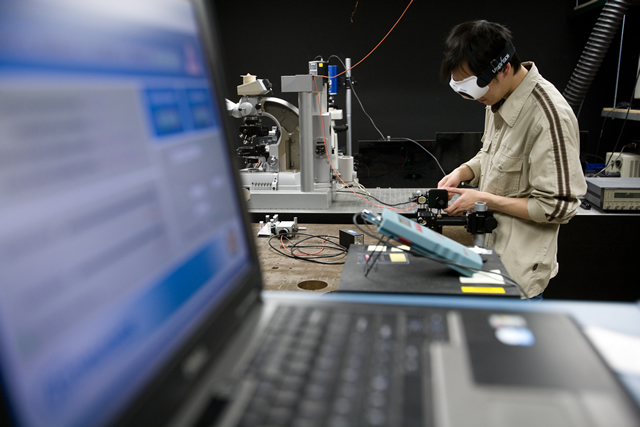
Computer Science ETDs
Publication Date
12-1-2015
Abstract
Human beings are driven to explore distant new worlds as we seek to better understand our place in the Universe. Because of the inherent dangers of human spaceflight, we often send robots as surrogate explorers, controlled from millions of miles away by teams of capable rover drivers here on Earth. As technology continues to advance, scientists and engineers aspire to build low-cost, durable, fully autonomous rovers to succeed today's tele-operated extraplanetary explorers. Here we aim to advance this goal by designing and programming robots that can successfully navigate unknown and variable environments. We present a swarm robotics system that mimics the foraging behaviors of seed-harvester ants, employing evolutionary computation and machine learning to mitigate the adverse effects of unreliable information, variable environments, congestion bottlenecks, and sparse resources. We describe a central-place foraging algorithm (CPFA) whose parameters are evolved by a genetic algorithm (GA) to maximize foraging performance under different experimental conditions. We find that foraging for resources in heterogeneous clusters requires more complex communication, memory, and environmental sensing than strategies evolved in previous work. Additionally, we observe sub-linear scaling in resources collected per robot as swarm size increases, which we attribute to the 'bottleneck' constraint imposed by central-place foraging. Finally, we augment our foraging robot swarm with machine learning and statistical models, demonstrating that combining our existing biologically-inspired CPFA with a cluster exploitation algorithm produces more efficient total resource collection compared to each algorithm acting alone. While our system is designed to be a demonstration platform for swarm robotics research, this work provides a foundation for designing and implementing autonomous robot swarms that can function outside of the academic research laboratory. The ability of robot swarms to tolerate sensor noise, adapt to variable environments, distribute work across large teams, and identify and exploit heterogeneously-distributed resources are all critical factors for successful remote exploration missions on distant worlds.
Language
English
Keywords
Swarm robotics, Biologically-inspired computation, Central-place foraging, Genetic algorithms, Agent-based models
Document Type
Dissertation
Degree Name
Computer Science
Level of Degree
Doctoral
Department Name
Department of Computer Science
First Committee Member (Chair)
Tapia, Lydia
Second Committee Member
Fierro, Rafael
Third Committee Member
Winfield, Alan F.T.
Project Sponsors
National Science Foundation, Defense Advanced Research Projects Agency, James S. McDonnell Foundation
Recommended Citation
Hecker, Joshua Peter. "Evolving Efficient Foraging Behavior in Biologically-Inspired Robot Swarms." (2015). https://digitalrepository.unm.edu/cs_etds/34
